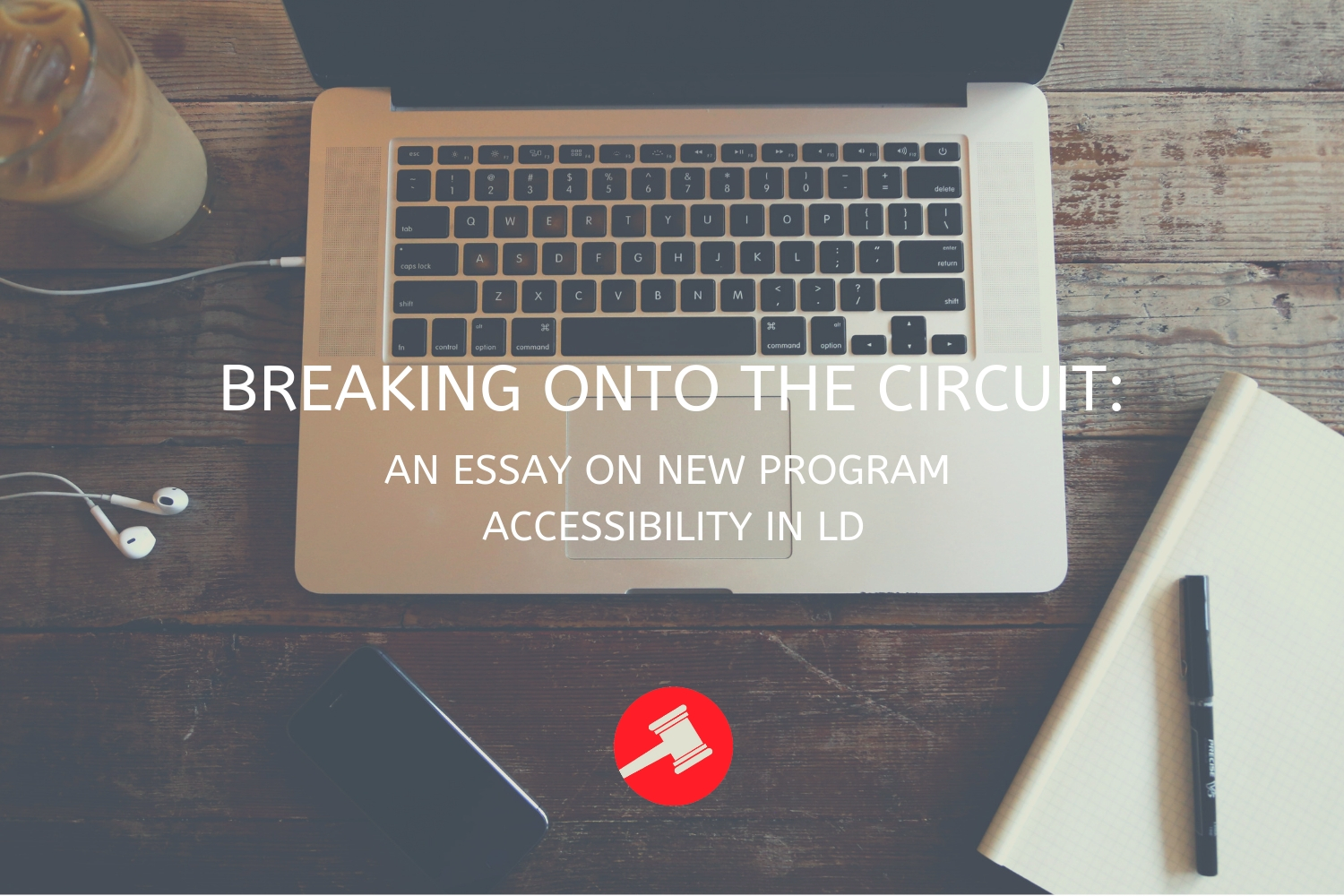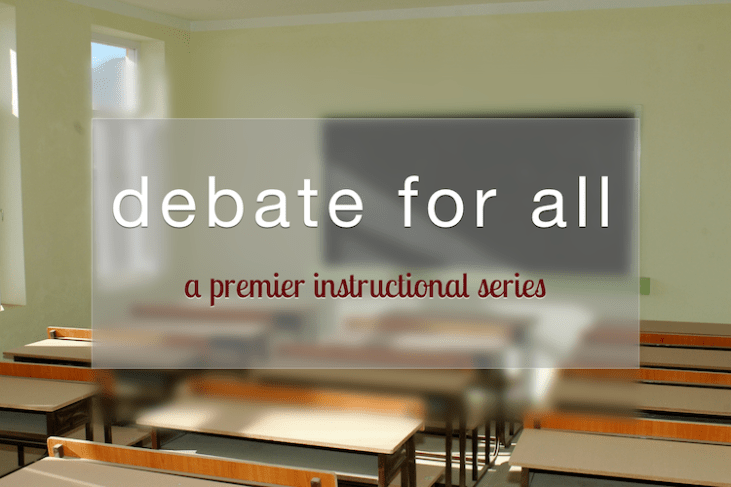Breaking Onto The Circuit (Noah Gallagher)

Noah Gallagher debated for four years at Lakeville North High School in Minnesota. Noah reached out-rounds at Blake his senior year and semifinals at the MN state tournament. He currently studies Environmental Engineering at the University of Minnesota and competes for their NPDA team.
Introduction
As a debater, the most educational and personally valuable rounds and research I engaged in were those based on progressive styles of debate, but my path to accessing those rounds was difficult. Reflecting on my experience now that I am a year out, I feel that often the only consideration “new program accessibility” receives is as a standard for theory arguments, but the conversation has to move out of round in order to effectively address this issue. While my experience is not the same as every new program, it represents one of the ways that we have new schools join our community. The team I debated for was geared primarily toward local traditional circuit competition.
My novice year the handful of returning upperclassmen described progressive debate as “bad debate” and didn’t elaborate much beyond that. This meant I was left to figure out circuit debate largely on my own. I got my first taste of circuit debate when I got hit with an Affirmative Framework Choice Shell. I didn’t know what to do other than just read my usual traditional NC even though I answered the AFC warrants, I lost the theory debate, and the ballot, because I didn’t read a competing interp. Most of my debate career mirrored that round; As a team, it felt like we were trying to learn the rules of the game as we played. Debate is an awesome activity and there is a lot to be gained from debating on the circuit, so I think it is important for those on the circuit to understand how current norms and resources affect how accessible debate is to newer programs so that we can push for a better, more accessible, debate.
What Helped:
The largest help in leveling the playing field was the availability of online resources. The disclosure wiki provided topic specific context to what a “circuit debate” looked like, with the most helpful resources being the full-text disclosures coming out of schools like Harvard Westlake. This helped our team find and recut cards relevant to the topic, and this was critical in making sure that we had prep that was viable on the circuit despite our lack of circuit experience. The first kritik that I wrote looked like a patchwork pulled from a variety of wiki pages and it didn’t work particularly well, but it was a starting point for developing a working knowledge of how kritikal debate works.
The wiki alone wasn’t enough though, and what really helped were the other debate knowledge repositories. Places like Premier Debate and Victory Briefs uploaded videos of debates which provides context to the arguments we were reading off the wiki and demonstrated how to execute strategies in an actual round. Those same sites also wrote about debate and broke down common args, with series like debate for all, which was particularly helpful in learning about theory which often times does not end up on the wiki (Big thanks to Bob Overing for his comprehensive articles on the ins and outs of theory).
What Hurt:
While it is obvious to many in the debate community that financial status can give advantages to certain debaters or team, we also ought to recognize the implications of legacy programs in the debate community and how that affects competition. Building backfiles takes time, and so does building a working knowledge of the circuit. Judge prefs take longer when you don’t recognize names and pre-round prep is spent looking up their paradigm instead of looking at the wiki to generate answers to your opponent’s case. And lacking massive backfiles to pull up ‘answers to’ makes that sort of answer generation more difficult. Even when I would attend a circuit tournament in Minnesota such as Blake, our team often felt excluded or out of place. It is really discouraging to walk into a round where your judge and opponent laugh over something that happened at a past tournament only to ask you “So where are you from?”
There are some community norms that made the circuit seem less welcoming. While most disclosure interactions we had were pleasant, some felt like deliberate intimidations. This usually occurred when a more established school would demand to know what the aff was and then give vaguer than usual answers about neg strats. Once a debater who had refused to disclose anything to us happily disclosed to the (more established) team seated next to us in the cafeteria. That debater might just not have had their morning coffee kick in before our interaction, but it certainly felt like they thought they could get away with more when talking to a school without debaters they recognized. The other major issue I experienced was the post rounding of judges. Debate is inherently competitive, but the arguing I saw after the RFD was downright toxic. In one particular instance, a coach started yelling at the judge to the point where I felt unsafe in the room and had to leave. That was the single worst experience in my debate career and nearly made me quit the activity. Coaches might disagree more with a loss to a program they haven’t heard of, or simply feel emboldened because there are fewer consequences for disruptive behavior if the opponent’s coach doesn’t have connections in the community or the right “social status”. Most post rounding is harmful, even if it wasn’t brought on due to program legacy, as many newer schools are migrating from more traditional circuits where arguing with the judge is often unheard of. This “culture shock” can turn debaters away from progressive strats if they associate spreading or kritikal debate with a toxic post-round experience.
What We Should Do
To better help newer programs, the circuit community can do a number of things. The first major category is to increase the good that currently exists. More full-text disclosure and publishing of round recordings just increases the springboard for new programs to jump off of. If you are a member of the circuit who has insight on a given issue, please write an article to explain it to those who might have never heard of it. Series like “Debate for All” are fantastic, and more writings to pull from just increases the accessibility. I would encourage more first-year outs, or even current debaters to pick up the torch on “Full Strat Disclosure,” writing articles that break down a case and the strategy behind it which provides the necessary context for new programs. Additionally, with the hosting for circuit debater closing, there is an opening for a new strat disclosure service, which if implemented properly could be invaluable, as open source frontlines and theory arguments are rather sparse on the wiki as it is.
The next solution is to be more conscious of how legacy affects behavior. Making an effort to engage with programs you may have never heard of and treating them with respect seems like common sense, and it really should be. We should offer the same disclosure practices to every team regardless of whether or not we recognize their name, and not assume the result of the round based on what programs the debaters come from. Judges can also help level the playing field, as regularly updated and organized paradigms really matter to debaters who may never have had a particular judge. Judges are also in control of pre-round banter, and ought to make sure that both debaters feel they will be given the same consideration. This might mean saying hi to coaches or competitors in the cafeteria instead of as the round is set up, or waiting until after the round to ask where the program is from.
Not every hurdle newer programs can be completely dismantled. Backfiles do take time to make and the best way to get to know judges is to compete in front of them year after year, and if a program does stick around eventually a reputation will develop. However, if the community takes accessibility for newer programs seriously we can make those hurdles less punishing and ensure that those who want to break onto the circuit have a fair shot and are not turned away from the activity.
For more suggestions about what you as a new team or an independent debater can do check out this article here.



